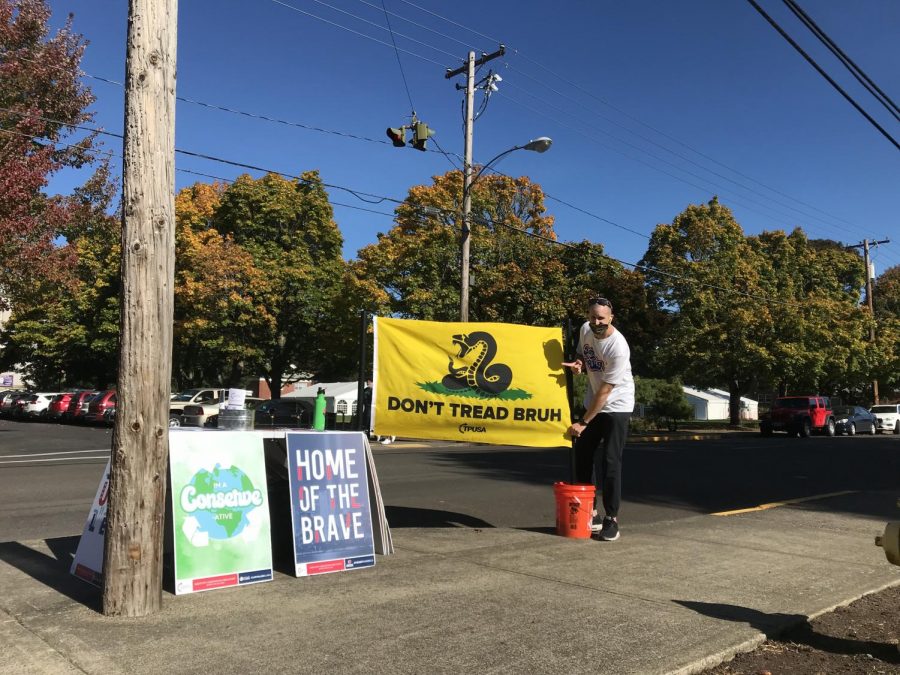Turning Point representative sparks debate on Linfield sidewalks
Austin Nealeigh standing next to his signs and flag on Tuesday, Oct. 20, 2020
October 27, 2020
As students walked to class or into Dillin for lunch on Tuesday, Oct. 20, they passed a bright yellow flag reading “DON’T TREAD BRUH.” Next to it stood Turning Point USA (TPUSA) representative Austin Nealeigh. He was on campus to discuss topics of free speech, limited government, and the importance of healthy discussion in today’s political climate.
TPUSA is an organization started by Charlie Kirk, a conservative activist and writer. Nealeigh, who is not a student at Linfield, said he is the Oregon TPUSA representative. He was interested in talking to students who might want to start a TPUSA chapter at Linfield.
Linfield currently has a Republican’s club, but not a TPUSA group on campus.
Initially, Nealeigh attempted to set up his table, flags, and signs on another street, but was told by LPS to move to Linfield Ave. Linfield Ave is a public street so it is not uncommon to see community members utilizing it to pass out pamphlets. Since it is public property, Nealeigh was also not required to wear a mask.
Shortly after Nealeigh set up his table, junior political science major Chelsea Armstrong took post across the street, quietly holding a small sign painted with a fist symbol typically associated with the Black Lives Matter movement.
After seeing Nealeigh, Armstrong decided to counter protest because she wanted to make sure someone advocated the other side. “I couldn’t sit there and let a message that is destructive and exclusive be present without the opposite message about equality and inclusion,” she said.
Almost immediately after Armstrong put her backpack down next to where she was standing, Nealeigh called out to her to respectfully ask if she wanted to cross the street and engage in discussion. During this interaction, a car passing by honked and the people inside yelled in support of Armstrong.
Armstrong declined at first. “I just don’t think it would be a very productive conversation,” she called back calmly.
“Most of the time, whenever I’ve had the opportunity to talk to people of a different mindset they are often set in their views and do more talking than listening,” Armstrong later said this is why she was hesitant to cross the road at first.
After a couple moments, she decided to talk to Nealeigh.
They began a conversation about the Black Lives Matter movement, but transitioned into a discussion about TPUSA. “We discussed his organization, which he claimed to be non-partisan, then continued to list the positive things Trump has done for BIPOC communities,” Armstrong said. BIPOC is an acronym used by many to mean Black, Indigenous, and people of color.
In the end, Armstrong did not feel the conversation was productive. From her perspective, the “conversation was one sided and uneducated, he spoke over me, wouldn’t listen, and continued to perpetuate false narratives of a glorified US.”
Nealeigh spoke positively about the experience afterward with The Linfield Review. Although he and Armstrong disagreed on a lot of topics, he felt they found some common ground.
After their conversation, some students stopped to support Armstrong, while others stopped at the booth to talk to Nealeigh. Nicholas Kinch, a freshman, was one of them.
Kinch did not see the need for a counter protest. “This guy’s ideas really didn’t seem extreme to me and he was reasonable and polite so I’m not really understanding the need for a counter movement,” Kinch said. “Especially for one guy with a sign.”
Kinch asked Nealeigh about Turning Point USA and their hopes of working with the on-campus Republican Club to bring public speakers to Linfield. He said that from what he could tell, “the guy didn’t appear to be racist.”
“That is what college is supposed to be about–lots of ideas,” Kinch admitted. “Some are going to be conflicting but they should be able to express them freely.”


G • Oct 27, 2020 at 6:43 pm
I actually find it destructive for students like Chelsea Armstrong to view a conversation as unproductive before even having it. I’m not surprised she found it unproductive either because she didn’t enter the conversation with an open mind. Higher education is all about the free exchange and debate of ideas in the pursuit of truth and if you really believe your ideas are correct, it is imperative that you be willing to reach out to those who disagree—not just hold up a sign.